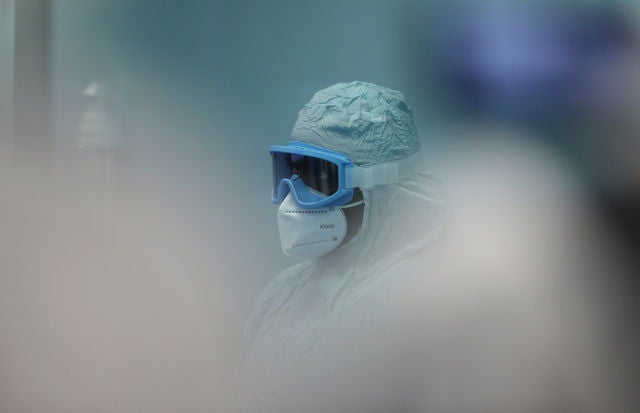African e-commerce platform helping revolutionize health care supply chains
The African Medical Supplies Platform for governments and NGOs is assisting the continent's health systems in overcoming challenges during COVID and beyond

In mid-2020, the global scramble for personal protective equipment reached a fevered pitch as countries around the world struggled to source N95 masks and other COVID-related medical supplies. For African governments, however, their search was particularly fraught.
Their challenge was four-fold. First, at the time, there was limited existing manufacturing of these products on the continent, forcing African governments to join the global bidding war for supplies. Second, manufacturers often prioritized larger orders, putting smaller countries, like tiny Seychelles with its population of less than 100,000, at the end of the line. Third, with planes grounded around the world, delivery of these supplies – especially smaller orders – became a challenge. And lastly, many manufacturers delayed responding to African leaders’ requests, assuming that they could not pay full price for the products or would delay payment.
“We weren’t preferred customers for many global manufacturers and suppliers,” said Chidinma Ifepe, the director of operations at the African Medical Supplies Platform (AMSP). “And we didn’t have visibility into what was available through Africa’s own manufacturers.”
To address this challenge, a pan-African group of supply chain and tech experts – including the Zimbabwean philanthropist and entrepreneur Strive Masiyiwa, who was also named the African Union’s special envoy for COVID response, and the Senegalese tech investor and entrepreneur Fatoumata Bâ – founded the non-profit AMSP. The initiative, launched by the African Union (AU), would be a quick and practical response to the Covid-19 pandemic. The platform today is supported by Janngo on behalf of the AU's Africa Centres for Disease Control and Prevention, in partnership with African Export-Import Bank and United Nations Economic Commission for Africa.
AMSP resembles a straightforward, user-friendly, e-commerce site available in four languages: English, French, Arabic, and Portuguese. Governments, NGOs, and health care providers can now find more than 1,000 COVID-related items for sale on the platform, from ventilators for US$2,600 to US$0.06 surgical masks. ASMP helps governments keep costs down by arranging for countries to coordinate their orders and buy in bulk. By aggregating orders, AMSP allows Cape Verde – population half a million – to pay the same price for its supplies as Nigeria, with a population of 215 million.
Over the past two years, AMSP has facilitated the procurement and distribution of 220 million COVID-19 vaccines obtained by the African Union's African Vaccine Acquisition Trust and has also facilitated the purchasing of tens of millions of highquality, lifesaving items for delivery to every country on the continent (and more than a dozen others – the service was opened to Caribbean nations last year).
And it is poised to deliver even more impact post-pandemic.
“COVID has provided us with a unique opportunity to support Africa’s health needs now and tomorrow," said Ifepe. “Now that there is a bit of stability with regard to COVID, we are considering how ASMP can best serve Africa’s medical needs post-pandemic.
As AMSP sees it, COVID could be a portal to a more unified, collaborative pan-African health care approach. Strategic changes to address key hurdles to improved health outcomes are already in the works.
The platform is expanding to provide non-COVID-related essential medicines and other supplies. This expansion addresses a critical problem throughout much of sub-Saharan Africa: counterfeit and substandard medication. In some parts of Africa, more than 30 percent of medicines sold are substandard or counterfeit. A computer model developed by the London School of Hygiene and Tropical Medicine estimated that fake or poor quality malaria medicines alone cost an estimated100,000 children’s lives each year in Africa.
“These substandard and falsified products are a menace to Africa,” wrote Ibrahim Assane Mayaki, CEO of AUDA-NEPAD and former prime minister of Niger, and Cheikh Oumar Seydi, the Africa director for the Bill & Melinda Gates Foundation in an article in the Africa Report.
AMSP’s sourcing of safe and effective medicine directly from manufacturers has the potential to save both lives and money. The platform has recently expanded to serve hospitals, pharmacies, and medical laboratories, allowing them to order online at competitive prices while also simplifying their procurement and distribution channels for fast-track delivery.
AMSP is also working with manufacturers of innovations developed during COVID, such as rapid tests, to adapt those technologies to address health challenges that threaten the continent. In this way, COVID innovations could accelerate broader health gains in Africa.
AMSP is also contributing to the growth of an African medical supply manufacturing sector. “We know that we need to generate the demand for African-made health care products to build the supply of these products,” said Ifepe. “For that purpose, today, one in three sellers on AMSP is Africa-based.”
The United Nations Economic Commission for Africa estimates that Africa imports about 94 percent of its pharmaceutical and medicinal needs at an annual cost of US$16 billion. COVID has helped demonstrate the cost in human lives of a medical supply chain that is sourced entirely offshore. Already, the pandemic helped a South African manufacturer for high-tech ventilators gain a foothold. More recently, the World Health Organization has selected Egypt, Kenya, Nigeria, Senegal, South Africa and Tunisia to establish mRNA vaccine production capacity.
AMSP’s expansion into pan-African non-COVID related support and supplies comes at a time when there is a growing movement toward pan-African strategies to address health challenges. This includes the African Centres for Disease Control, which just celebrated its fifth anniversary; the African Medicines Agency, which will allow drug companies to go through one assessment process to obtain authorization to distribute in all African countries; and the African Continental Free Trade Area, established last year with the goal of reducing tariffs and expanding trade between African countries.
